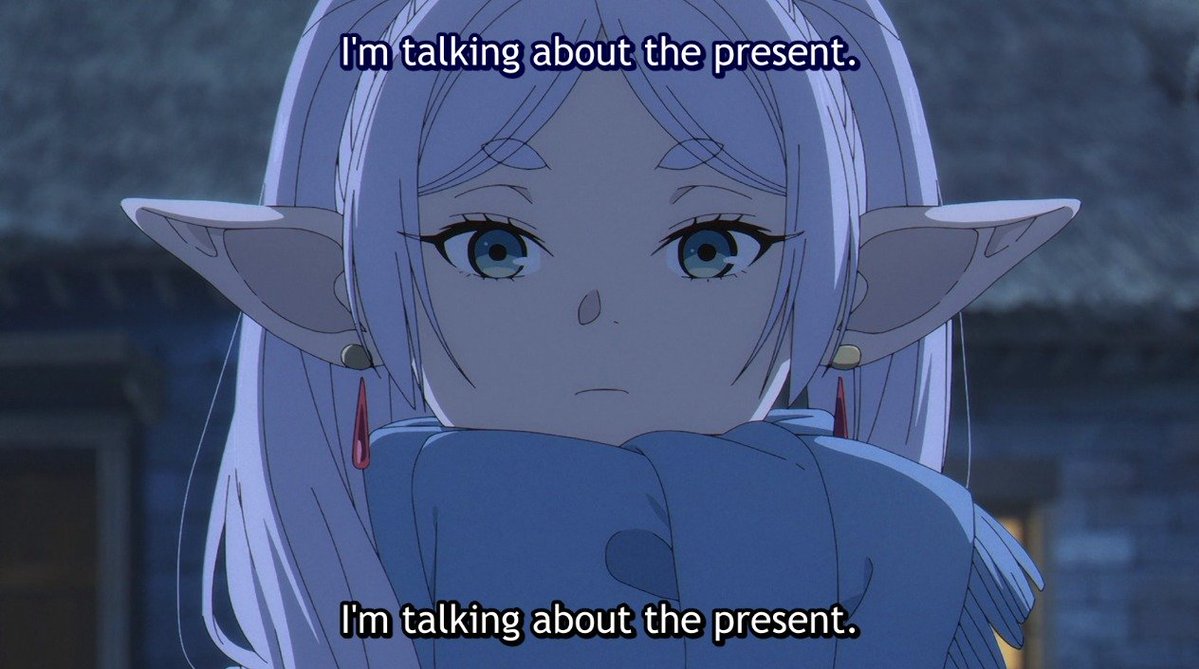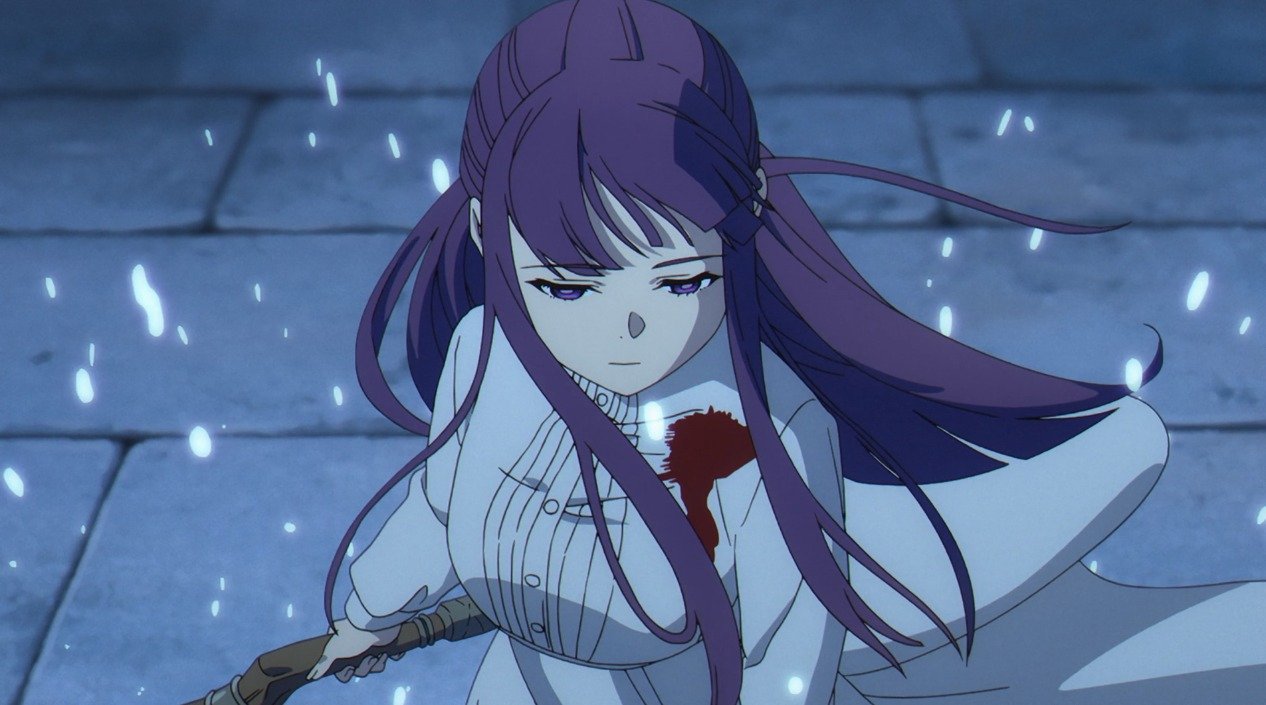Season aired: Fall 2023
Number of episodes: 28
Watched on: Crunchyroll
Translated by: ?
Genres: Fantasy, Drama, Adventure
Thoughts: I went into Frieren: Beyond Journey’s End with high expectations. Based on a critically acclaimed manga, with the director behind Bocchi the Rock!, and with a synopsis that signaled there was only everything to love about the story, I knew the anime was either going to be my biggest disappointment or my greatest love with nothing in between. As of today, Frieren: Beyond Journey’s End is my greatest love.
Frieren: Beyond Journey’s End explores what happens in life after you’ve completed your hero’s journey. So often, stories focus on the trials and tribulations of saving the world, but very rarely do stories take a look after “the end.” The anime tackles this through Frieren’s point of view. As an elf, she lives with such longevity that 50 or 100 years feels like barely any time has passed in her life. However, her perspective of the world sharply changes when after a “mere” 50 years, she begins to lose her companions and closest friends who had helped her kill the demon king. Thus begins a different journey – a journey to appreciate how quickly life changes while still holding onto the past.

The series’ biggest strength is its ability to portray the grief of losing time. The most iconic of scenes is Frieren breaking down in shock at how quickly Himmel, her closest companion, died of old age as a human, though there are so many other gentle yet equally emotional reminders to the reality of Frieren’s longevity. An old man that Frieren talks to in a village was once a precocious little boy who naughtily flipped Frieren’s skirt when she passed by with her friends decades before. A middle-aged father she helps is a descendant to a now-deceased man she helped in the past. Even in happier moments, the audience is reminded of that underlying grief, such as with Fern who was only a tiny girl at the beginning but towers and weighs more than the elf after a few episodes.
This feeling of time quickly passing by is accomplished through the narrative structure. Between two scenes, two years could pass, but like Frieren, we feel like it was seconds because of how the scenes jumped. Montages are used to the fullest, showcasing various activities that the protagonists engage in with a leisurely pace, leading us to believe that only a few days passed when in reality, it was months. Life feels simultaneously long and short through the direction of the story, and it’s a feeling we all know well. The older we get, the faster time passes by, and we’re often left wondering how two years jumped in the blink of an eye.

Yet, the quicker life speeds up, the more we try to hold onto the past. This too is portrayed fully through divergent storylines. While the majority of the series takes place after Himmel’s death, the journey that brought Frieren to her companions — Himmel, Eisen, and Heiter — continuously overlaps itself with the present. Through this technique, the audience not only connects with the current team of protagonists, but also grows to love the people Frieren lost, experiencing firsthand how and why her team of heroes influenced her enough to move past the apathy that long-living elves often trap themselves in.
This entwining of storylines also allows for exciting adventures despite the calm, leisurely feel of the story. The past is constantly filled with exciting battles with demons, while the present is filled with the adrenaline of watching young blood take over the roles of the old. One of the most exciting fights in the entire series is not even with the titular protagonist but with Fern, her young human apprentice. Facing a powerful demon, Fern struts her way to victory, barely flinching at the attacks and showcasing the full range of strategic magic that Frieren has passed onto her. There is grief but also hope and awe for the future, leaving the audience marveling at what future generations could bring even after losing venerable heroes of the past.
This couldn’t be done without the impeccable animation. However, it would be a disservice to only attribute the animation to its fight sequences in a series as powerful as Frieren: Beyond Journey’s End. What the anime brings that the manga couldn’t is movement in all the characters, bringing a level of subtlety that couldn’t be captured in the original source material. Stark’s hands often quiver before battle. Fern’s eyes pull slightly together when trying to hide her annoyance. Frieren’s earrings glimmer in the light whenever she moves, a direct reference to the ties Frieren holds deeply to her deceased human mentor. This level of detailed animation is rare in the anime industry nowadays due to a lack of training and bad industry practices, and its importance becomes ever more apparent upon seeing a series actually utilize it to its fullest. Frieren: Beyond Journey’s End simply wouldn’t hit the same without its incredible animation.

The same can be said for the soundtrack. As mentioned earlier, the anime uses a motley of montages to warp the viewers’ sense of time, but the montages are often without dialogue. Instead, the scenes are overlaid with music to tell the story, and for every montage, a different track is used to effectively illustrate the atmosphere, the world, and the characters. In fact, the series itself has less dialogue than most – completely dropping internal monologues or laborious explanations in favor of showing the audience and allowing the viewers to come to their own conclusions. Music is essential in showing, and many of the most memorable scenes are told entirely through the soundtrack rather than with words. Evan Call’s work as the composer is immaculate.
I often try to balance reviews with strengths and flaws, but in a rare case, I don’t want to find flaws. The truth is, Frieren: Beyond Journey’s End made me appreciate life more. Through its characters, its themes, and its astounding execution of the nuanced story, I end each episode looking at my own life, appreciating the journey I have traveled and wondering in anticipation at what is still yet to come.
Rating
Plot: 10 (Multiplier 3)
Characters: 9 (Multiplier 3)
Art/Animation: 10 (Multiplier 2)
Voice acting: 7.5
Soundtrack: 10
FINAL SCORE: 94.5
